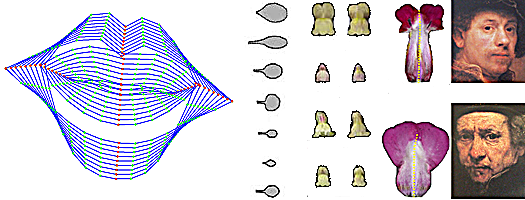AAMToolbox Details: Difference between revisions
Jump to navigation
Jump to search
No edit summary |
No edit summary |
||
| Line 10: | Line 10: | ||
Some shapes of mouths, leaves, petals and portraits | Some shapes of mouths, leaves, petals and portraits | ||
|} | |} | ||
==<span style="color:Navy;">How does | ==<span style="color:Navy;">How does this measure shapes?</span>== | ||
==<span style="color:Navy;">Limitations?</span>== | ==<span style="color:Navy;">Limitations?</span>== | ||
Revision as of 09:28, 19 October 2012
What is the AAMToolbox and why?
| We wish to understand how the biological organs grow to particular shapes. For this we need a tool to help us think through what we expect to see, i.e. model growth (GFtbox), and we need to make measurements of real biological organs to test our expectations (hypotheses).
However, the shapes of biological organs rarely make measurement simple - how do you measure the two or three dimensional (2 or 3D) shape of an ear, leaf or Snapdragon flower? The AAMToolbox is designed to measure the shapes of organs relative to each other.
|
 Some shapes of mouths, leaves, petals and portraits |